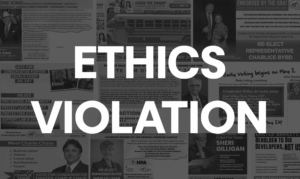The 43,000-member Georgia Association of Educators (GAE) on Monday released its list of endorsements for the upcoming statewide primaries. It was no surprise that only Democrats won GAE approval.
“Ours is a very exacting and detailed two-step process,” said GAE President Jeff Hubbard. “Our political action committee, the GAE Fund for Public Education Committee, first sent out questionnaires to all declared candidates for statewide offices. We next set up face-to-face interviews with those who responded to the questionnaires so the committee could ask any clarifying questions.”
Hubbard said that from this process came the endorsement recommendations that were then voted on by the GAE Board of Directors that is composed of District Directors from around the state as well as directors who represent administrators, education support professionals, students, higher education, and retirees.
Hubbard in the June 14 press release said that questionnaires were sent to all declared candidates. The press release did not divulge whether Republican candidates simply did not respond to the questionnaires or whether there responses were deemed unacceptable or invalid. In the end, and except for candidates for governor, the GAE endorsed candidates whose party has historically garnered the support of unions or organized labor associations.
The surprise to many people may be that GAE did not endorse anyone in the Democratic gubernatorial primary, said Hubbard.
“All of them had their individual strengths as to what they could bring to public education,” said Hubbard. “At the end of our interviews, the committee felt that there was no one consensus candidate. This was probably the strongest group of candidates we’ve interviewed with regard to their clear priorities on how they wanted to improve public education. It was concluded that all of them could be effective advocates for Georgia’s children and public education. The Democratic electorate has strong choices as to who they want to represent them in the general election.”
The complete GAE statewide office endorsement list is as follows (Senate and House endorsements are forthcoming):
• Gubernatorial Primaries – no endorsement
• Lt. Governor – Carol Porter (D)
• State Superintendent of Schools – Joe Martin (D)
• Secretary of State – Gail Buckner (D), Michael Mills (D), Gary Horlacher (D), Georgeanna Sinkfield (D) (Acceptable)
• Labor Commissioner – Darryl Hicks (D
• Insurance Commissioner – Mary Squires (D)
• Attorney General – Rob Teilhet (D), Ken Hodges (D) (Acceptable)
• Agriculture Secretary – None
Unionized or not, teachers organizations across America have long held to the Democratic Party worldview and, accordingly, have largely endorsed Democratic candidates. This is not surprising, given that tenured public education in America has no competition and, along with benefits and retirement plans, is funded exclusively by the work of others outside the education industry through taxpayers dollars. Both locally and nationally some, but not all, teachers throughout the recession have exhibited a type of outlook that holds teachers as being entitled to continued levels of pay and benefits even though many of the taxpayers that fund their livelihood are out of work and losing their homes.
An example of this mindset was evidenced at a meeting held by Sen. Mitch Seabaugh with Coweta County School System employees on Nov. 19. Seabaugh spoke frankly with school system staff, noting the severe impact of the recession on state revenues and the likelihood that the financial picture would not improve for some time.
One teacher in the group noted that her salary and her husband both come from state funds.
”When will the governor consider raising taxes,” she asked sincerely, indicating that it should not be the task of state employees (including teachers) to carry the load for the state.
“We’re entering into an unprecedented property tax situation. Who will you tax?” Seabaugh asked in response. His question to the teacher was straightforward. “Nineteen out of 20 people I know are making substantially less than they were a year ago.”












Leave a Comment
You must be logged in to post a comment.